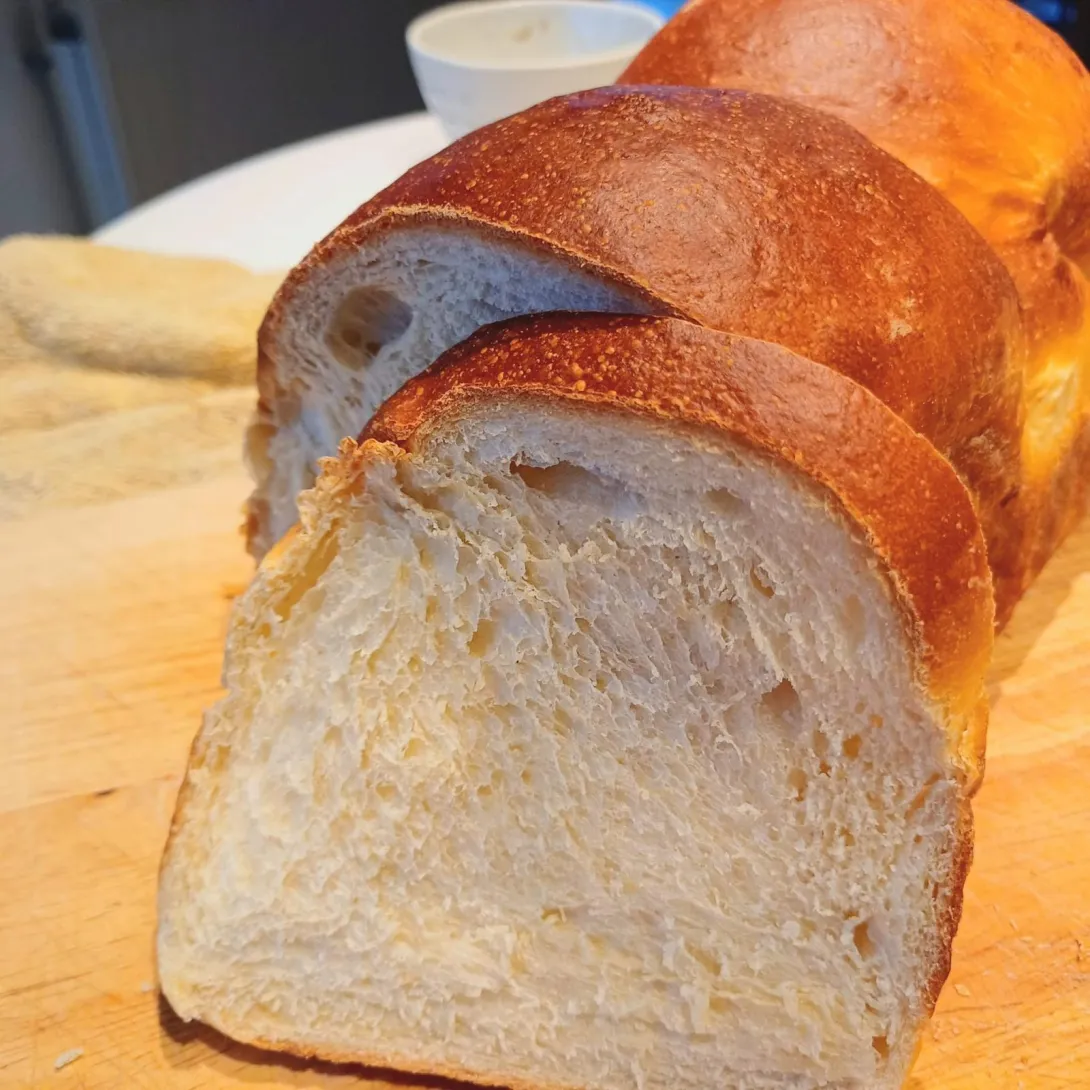
I have only posted hearth loaves so far because that's where the bulk of my experimentation goes on, but I do bake soft loaf pan bread for my kids twice a week. Preparing breakfast and lunch sandwiches for the kids five days a week means a lot of bread, and I prefer to know what goes into this significant part of their diet!
The usual formula for the kid's bread is simple. For a 1.1kg loaf, I combine 25% whole grain with 75% bread flour, milk, 1.5g yeast, 10g salt, 2 tablespoons of butter, and 1 tablespoon of sugar, around 77% hydration.
The process is even simpler and completely integrated into a lazy person's (me) schedule - only 6 mins of hand kneading in total without a mixer. Whatever whole grain I choose goes into the tangzhong. I then mix everything together except for the butter. I leave the mess alone for at least 30 mins before I knead it for 3 mins. Another 30 mins before I mix in the butter and knead it for another 3 mins. The bulk fermentation takes around 6-8 hours at around 19 to 20 degrees, during which I give it at least 3 solid stretch and folds. Final proof of 1.5 hours, top brushed with sweet milk mixture, and baked for 38 mins at 175 degrees.
The reason I'm posting about this really simple recipe is because I used khorasan for the first time yesterday and it produced a fragrant, soft and utterly delicious loaf. Phenomenal and unbelievable. I have used all sorts of ancient grains in the kids' loaves, but khorasan has produced such excellent results in terms of crumb texture and taste. Nutty, buttery, and so delicately earthy - really, really different from emmer, einkorn, spelt, and other friends. A delight to knead at 25%, producing extremely shreaddable bread with a thin and tasty crust that the kids do not discard.
Please do give khorasan a try and let me know how it goes for you!
Notes:
1. Using the wholegrain in the tangzhong has produced much more fragrant and softer loaves than mixing it directly into the final dough and using white in the tangzhong.
2. A long fermentation with little yeast and a couple of S&Fs is very important for a soft, shreddable bread if you're lazy like me and don't like to knead too much!
3. Dough must reach around 2.5x at the end of BF.
4. I find that I have the best results of a soft crumb, good oven spring, and fewer big, uneven holes if I end final proof before the dough has doubled - around 1.75x.
- ll433's Blog
- Log in or register to post comments
Lovely loaf again Lin. I have used khorasan flour only once, but it was one of the most pleasant early baking experiences as the handling of the dough was so easy and satisfying. Plus the bread was very nice. It was like an easy version of a durum wheat flour loaf with similar flavour I found.
I like the idea of using the ancient grains in a tangzhong, specially if they are not contributing much to the gluten structure of them loaf. In my experience, however, the khorasan flour produced good gluten and loaf structure. I would be very interested to try it with my shaggy SD biga. I have an intuition it would work well.
Agreed, Rene. I think Khorasan holds up very well and I would be interested to see how it performs in a shaggy SD biga. Did you go with a 50% loaf previously? I was wondering how far I can push the khorasan and still keep these loaves very kid-friendly in terms of texture and taste.
Happy new year Rene, and I wish you lots of very fulfilling baking this year.
-Lin
Lovely one Lin, so shreddy looking, can't believe you mixed this by hand.
I'll have to make something similar (infuriatingly can't buy Khorasan flour here) and will just need to somehow reduce the sugar so that my health conscious children eat it (your kids are obviously little!)
Tell me, how much liquid do you use in your Tangzhong?
-Jon
Thanks so much, Jon. I think the sugar can be completely eliminated without much difference. I'm on a quest to gradually lower their sugar intake in bread, because most of the soft bread produced here can be quite sweet. We're down to one tablespoon for an entire loaf now! Khorasan does give a natural sweetness that I did not really find in other ancient grains. Perhaps emmer comes close, but it is slightly more bitter, I feel.
I generally go with a 1:3 ratio for my tangzhong. I find that still having enough milk left to mix into the final dough has produced softer bread!
Lin
I too love using various whole grains in the tangzhong. Since the proteins will be denatured you can use any flour you want in the tangzhong it seems and get the goodness out of it. I don’t think I’ve tried Kamut in a tangzhong yet, I’ll have to add that to my list once I see it in the shops again.
Happy New Year Lin.
Benny
I hope you will give Kamut a try, and do let us know how it turns out. I agree with you - the tangzhong really gets the goodness out of them whole grains. I did not think much about it initially, but now I'm completely convinced.
Happy New Year to you too, Benny. Best wishes for more joy and bakes this year!
-Lin